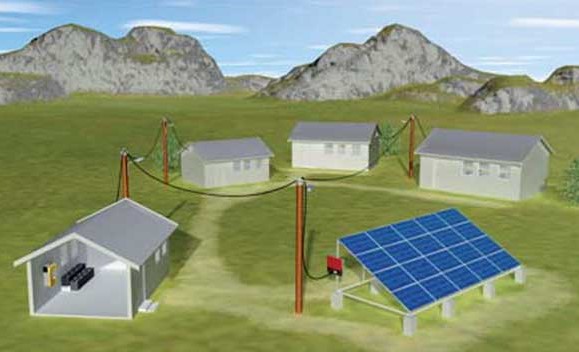The Federal Government on Monday, February 11, 2019 commissioned a N146 million national grid connected 60 KiloWatt (KW) solar mini-grid electricity plant to supply power to 350 households in Torankawa community in Sokoto State.

The project was initiated by the Department of Renewable and Rural Access (RRD), Federal Ministry of Power, Works and Housing, under the Renewable Energy Micro Utility Programme.
The project, commissioned by the Minister of Women Affairs and Social Development, Hajia Aisha Abubakar, was funded with proceeds from the Nigerian Sovereign Green Bond (SGB) issued by the Federal Government in 2017.
The project, which is Public Private Partnership (PPP) driven, was developed by Messers News Engineering Nigeria Ltd and Protogy Global Services Ltd, indigenous companies operating in the country.
The acting Director, RRD in the ministry, Alhaji Faruk Yusuf said the project would provide electricity to 350 households and 20 Small and Medium Enterprises (SMEs).
According to him, the plant will supply power to ultimately 1,750 people in the community.
Yusuf said the project would also power 50 100watt LED street lights, Mosques, and the community’s irrigation farm among others.
He said the project could operate both in grid connected model or non-grid connected environment like an island.
The acting director said the grid connected hybrid solar voltaic mini grid, completed within three months had 99 per cent assurances of supplying 24 hours, seven days high voltage electricity to the community all year round.
According to him, the plant comprises 125KVADC/ AC Inverter, 60KW Solar Photophotics (PV) Modules, 216 kilowatt hours (kWh) battery bank , and 100KVA diesel generator as redundant back up.
Yusuf said the project also included rehabilitation of four kilometers Town Distribution Network (TDN) and installation of 100 smart meters and local electronic vending system.
The minister in her remarks said the project was unique as it was the first grid connected solar mini project implemented in Nigeria by the Federal Ministry of Power, Works and Housing.
She said the project was a demonstration of President Muhammadu Buhari’s administration’s commitment to providing Nigerians with incremental stable and reliable power supply.
Abubakar said implementation of the project was also part of Nigeria’s contribution toward promoting and archiving sustainable energy for all.
“This project is a demonstration of the viability of deploying alternative energy in technology to provide rural communities 24/7 reliable power supply.
“The electricity will improve the life of rural dwellers through improved health care, education and agricultural production.’’
She said Buhari in his efforts to rapidly provide access to electricity had developed policies and regulations to attract private sector participation in the power industry.
She said the polices were in financing, developing, operation and maintenance of rural electrification projects using renewable sources.
“The mini-grid approved by the Nigerian Electricity Regulatory Commission (NERC), provides opportunity for private investors and has started yielding results, as 20 mini-grid projects have been commissioned across the country in 2017 and 2018.
Abubakar said the commissioned mini-grids power projects was providing reliable power supply to more than 20,000 people in off-grid project areas of the country.
“This project in Torankawa has been developed to demonstrate economic viability and sustainability and will be concessioned to a private operator that will be responsible for operation and maintenance.
“It is necessary therefore, that the electricity users pay for the use of the electricity to ensure that the project keeps delivering power over its life span.’’
The minister commended Torankawa people for their cooperation, not only in providing the land for the project but for also committing to purchasing the electricity generated from the project.
She called on other communities to emulate the peaceful and dynamic attitude of the Torankawa community.
Abubakar also called on states, local governments and the private sector to take advantage of Federal Government’s policies on electricity and initiate Public-Private Partnership (PPP) to provide electricity to rural communities across the country.By Kingsley Okoye
